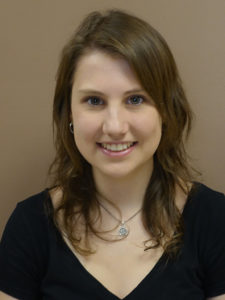Congratulations to Melanie Ernst for being selected for the 2021 MilliporeSigma Fellowship
 Melanie Ernst is a fourth-year graduate student in the Biochemistry, Biophysics and Structural Biology (BBSB) program. She is completing her Ph.D. thesis work in the laboratory of Dr. Janice Robertson, Associate Professor in the Biochemistry and Molecular Biophysics department, where she uses single-molecule techniques to study the folding of ion channels in membranes.
Melanie Ernst is a fourth-year graduate student in the Biochemistry, Biophysics and Structural Biology (BBSB) program. She is completing her Ph.D. thesis work in the laboratory of Dr. Janice Robertson, Associate Professor in the Biochemistry and Molecular Biophysics department, where she uses single-molecule techniques to study the folding of ion channels in membranes.
Melanie joined the BBSB program after receiving a Bachelor of Science in Biological Chemistry from Mannheim University of Applied Sciences in Mannheim, Germany. During her undergraduate studies, Melanie studied red blood cell physiology and the biocompatibility of artificial red blood cells.
In her thesis work in Dr. Janice Robertson’s lab, Melanie uses single-molecule TIRF microscopy and electrophysiology to study the folding of the bacterial fluoride channel Fluc. To exhibit their various functions, ion channels need to faithfully assemble into the membrane. They need to form a stable structural scaffold to support continuous, hydrophilic ion pathways and use independent mechanisms to link protein stability to selectivity, conductance, and gating. To better understand how ion channels balance this stability and function, Melanie studies the dimerization reaction of the dual topology dimer Fluc. After demonstrating that wild-type Fluc is a long-lived stable dimer in membranes, Melanie’s thesis work investigates what dictates Fluc dimer stability, protein-protein interactions, a buried cofactor Na+ ion at the dimerization interface, or membrane dependent forces.
Melanie currently serves as Co-Chair on the Biochemistry and Molecular Biophysics departmental Student Liaison Committee as well as serves as bookkeeper for the Division of Biology and Biomedical Sciences Women in STEM. She is also a cohort liaison for the Continuing Mentoring program with the Young Scientist Program, where she works with other graduate students to mentor high school students in St. Louis.
